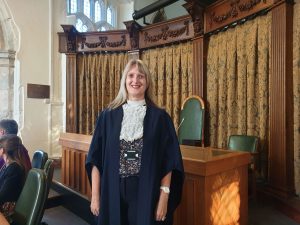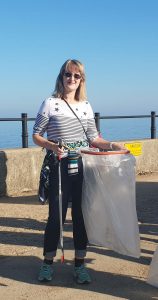 Conservative Rachel Carnac is the Canterbury City Councillor for Reculver ward, and has just been elected Deputy Leader of the Council and Deputy Leader of the Conservative group. Tipped as a high-flyer, she was appointed chair of one of Canterbury City Council’s (CCC’s) main committees soon after her election in May 2019 — and just 16 months on, she is second-in-command among the 39 councillors on CCC. She talks to Neasa MacErlean about her interests in climate change, diversity, rural issues and — outside the chamber — soul and funk.
Conservative Rachel Carnac is the Canterbury City Councillor for Reculver ward, and has just been elected Deputy Leader of the Council and Deputy Leader of the Conservative group. Tipped as a high-flyer, she was appointed chair of one of Canterbury City Council’s (CCC’s) main committees soon after her election in May 2019 — and just 16 months on, she is second-in-command among the 39 councillors on CCC. She talks to Neasa MacErlean about her interests in climate change, diversity, rural issues and — outside the chamber — soul and funk.
How does your background as a journalist help you as a councillor? (Rachel Carnac was a journalist until 2002 when she set up her own events business in the metals sector with her business partner.)
One of my first bosses told me that to be a good journalist you have to listen. That’s also part of being a councillor. As a journalist, you have to be open-minded all the time. As a councillor you also have policies and a vision. But the skills a journalist would have — listening, analysis, questioning, scrutinising — are all ones a politician would want to have.
What is it like being a Councillor?
It takes over your life. I don’t know if I really expected that before that my life would be quite as different as it has become in being there for residents all the time. And it’s also exceeded my expectations. I was told it would be quiet for the first year (for a new councillor like me) but then I was made chair of one of the service committees, the Regeneration & Property Committee.
Can you tell us about what you are doing on the Regeneration & Property Committee?
It handles the business side, including the revenue-generation side, of the Council — parking, business, Whitefriars…So it is a key part of Council. Everything has been ground down by Covid-19. We haven’t had our committee meetings, but we are restarting now albeit virtually.
The challenge everywhere — nationally, internationally, locally — is climate change, and meeting the objective of reducing pollution and emissions. We have set a very tough target to reduce carbon emissions to net zero by 2030. So a lot of what we are working on now has to be to that remit. With covid, there will be a big role for the Council in helping businesses back onto their feet. As we begin that we have to convince people to travel in different ways and to get out of the car as much as possible through walking, cycling and public transport. There is a question mark over public transport during covid but afterwards, at some stage, it will be much easier. It’s all challenging, though. How do you sell the benefits of this in a location like ours where two thirds of the area is rural?
Have you got to know the Labour councillors and Lib Dems?
A very little bit. That was all starting to happen when covid began. Now all our meetings are virtual so you don’t have the impromptu meetings that took place when we met at the Guildhall.
How much can Councillors collaborate across party?
That’s important. It tends to happen in the working groups (which I’m not on). Also, I think councillors are coming together now to work on the Local Plan.
In her interview with us in the last issue, Labour Cllr Mel Dawkins talked of being disappointed at the Conservatives being whipped. How do you respond to that?
I don’t understand that. We haven’t had a whip (until just this month). I’ve never felt in a position where I’ve been told I’ve got to do something.
Are you on the Conservative parliamentary candidates list?
No. I’m quite happy doing what I’m doing at the moment.
You are involved in the Conservative Women’s Organisation. Can you tell us more?
The CWO has been very helpful in terms of providing all sorts of training — on public speaking and standing for office, for instance. But it’s not about prioritising women over any other group; it’s about encouraging people who might otherwise never think of getting into politics. We need greater diversity in our politics.
What are the issues facing Reculver?
Reculver is a largely rural ward so it faces some of the rural issues — particularly balancing keeping the villages alive against what some developers want. We try to protect the rural nature, the open spaces and the coastline.
The officers at Canterbury City Council have been amazing. As councillors, we played a role as a conduit. With residents, we were putting them in touch with officers. They got everything going very quickly — starting with the hub. Now they are working with businesses on the recovery.
Can you tell us what you are doing and what you want regarding Plastic Free Herne Bay ?
We had got the status as ‘Plastic Free Herne Bay’ at the start of the year. We had a small group of volunteers and were just going to meet and to present plaques — but that all got stopped through covid. We are starting to get back now.
The really awful thing is the enormous amount of plastic everyone is being encouraged to use again. There is so much plastic in masks, for instance. And we are encouraged to drink bottled water and to drink from straws. There’s a lot of work that needs to be done again.
Looking at the Conservative party here, how do you feel about the change of leader at CCC and in the Conservative group? (Ben Fitter-Harding has just become leader of both, after the majority of the local party councillors supported him in a challenge against former leader Rob Thomas.)
At times when the situation is different, then people find they need a changed approach. A different vision can mean you need a different person at the head. Cllr Rob Thomas is a fantastic person and councillor and I’m sure everyone in the district appreciates his hard work. Cllr Fitter-Harding will take the council and district forward in these changed and challenging times.
And what about Brexit? Do you have concerns on how our area would be hit in the case of a no-deal exit?
A no-deal Brexit would be challenging. For some businesses, it would be a difficult; for others it would be a massive opportunity. I’d like to see us benefit from investment and employment. We are very reliant on the service economy in Herne Bay: we need to diversify and bring in more jobs across our district. Given that Kent is the gateway to the continent, that could prove really promising.
What got you into politics? What do you do outside being a Councillor? Tell us a bit about your day-to-day life?
I started off with small campaign issues on planning and development when I lived in London, before I moved to Herne Bay. I think there is no point criticising: you need to be part of the process if you want to try to make change.
Outside politics, I like boating and fishing. We have a small fishing boat so I go out on that. I like going out and eating out. And I like all sorts of music, particularly funk and soul — especially Marvin Gaye, Bobby Womak, Gladys Knight, George Benson, Sam Cooke…I thought I was going to like gardening but I don’t really have time for it….And I also have a husband and two cats. My husband is retired and isn’t interested in politics at all. So we’re not one of those couples that are both focused on politics.
But being a councillor has put me on a steep learning curve. Sometimes you try to do things and you can’t and it can be very frustrating. But then, out of the blue, you get an email from a resident who thanks you and that’s what makes it worth doing.
Rachel Carnac’s Committees
Full membership
Council
Policy and Resources Committee (Vice Chair) and Deputy Leader of CCC
Regeneration and Property Committee
Governance Committee
Audit Committee
Standards Committee
Membership as Reserve
Appointments Sub Committee
Joint Transportation Board
Regulatory and Appeals Sub Committee


0 Comments